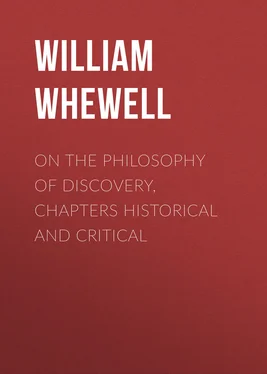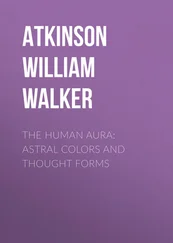William Whewell - On the Philosophy of Discovery, Chapters Historical and Critical
Здесь есть возможность читать онлайн «William Whewell - On the Philosophy of Discovery, Chapters Historical and Critical» — ознакомительный отрывок электронной книги совершенно бесплатно, а после прочтения отрывка купить полную версию. В некоторых случаях можно слушать аудио, скачать через торрент в формате fb2 и присутствует краткое содержание. Жанр: foreign_prose, foreign_religion, Философия, foreign_psychology, foreign_antique, на английском языке. Описание произведения, (предисловие) а так же отзывы посетителей доступны на портале библиотеки ЛибКат.
- Название:On the Philosophy of Discovery, Chapters Historical and Critical
- Автор:
- Жанр:
- Год:неизвестен
- ISBN:нет данных
- Рейтинг книги:5 / 5. Голосов: 1
-
Избранное:Добавить в избранное
- Отзывы:
-
Ваша оценка:
- 100
- 1
- 2
- 3
- 4
- 5
On the Philosophy of Discovery, Chapters Historical and Critical: краткое содержание, описание и аннотация
Предлагаем к чтению аннотацию, описание, краткое содержание или предисловие (зависит от того, что написал сам автор книги «On the Philosophy of Discovery, Chapters Historical and Critical»). Если вы не нашли необходимую информацию о книге — напишите в комментариях, мы постараемся отыскать её.
On the Philosophy of Discovery, Chapters Historical and Critical — читать онлайн ознакомительный отрывок
Ниже представлен текст книги, разбитый по страницам. Система сохранения места последней прочитанной страницы, позволяет с удобством читать онлайн бесплатно книгу «On the Philosophy of Discovery, Chapters Historical and Critical», без необходимости каждый раз заново искать на чём Вы остановились. Поставьте закладку, и сможете в любой момент перейти на страницу, на которой закончили чтение.
Интервал:
Закладка:
Galileo, another of Gilbert's distinguished contemporaries, had a higher opinion of him. He says 148 148 Drinkwater's Life of Galileo , p. 18.
, "I extremely admire and envy this author. I think him worthy of the greatest praise for the many new and true observations which he has made, to the disgrace of so many vain and fabling authors; who write, not from their own knowledge only, but repeat everything they hear from the foolish and vulgar, without attempting to satisfy themselves of the same by experience; perhaps that they may not diminish the size of their books."
8. Galileo. —Galileo was content with the active and successful practice of experimental inquiry; and did not demand that such researches should be made expressly subservient to that wider and more ambitious philosophy, on which the author of the Novum Organon employed his powers. But still it now becomes our business to trace those portions of Galileo's views which have reference to the theory, as well as the practice, of scientific investigation. On this subject, Galileo did not think more profoundly, perhaps, than several of his contemporaries; but in the liveliness of expression and illustration with which he recommended his opinions on such topics, he was unrivalled. Writing in the language of the people, in the attractive form of dialogue, with clearness, grace, and wit, he did far more than any of his predecessors had done to render the new methods, results, and prospects of science familiar to a wide circle of readers, first in Italy, and soon, all over Europe. The principal points inculcated by him were already becoming familiar to men of active and inquiring minds; such as,—that knowledge was to be sought from observation, and not from books;—that it was absurd to adhere to, and debate about, the physical tenets of Aristotle and the rest of the ancients. On persons who followed this latter course, Galileo fixed the epithet of Paper Philosophers 149 149 Life of Galileo , p. 9.
; because, as he wrote in a letter to Kepler, this sort of men fancied that philosophy was to be studied like the Æneid or Odyssey , and that the true reading of nature was to be detected by the collation of texts. Nothing so much shook the authority of the received system of Physics as the experimental discoveries, directly contradicting it, which Galileo made. By experiment, as I have elsewhere stated 150 150 Hist. Ind. Sc. b. vi. c. ii. sect. 5.
, he disproved the Aristotelian doctrine that bodies fall quickly or slowly in proportion to their weight. And when he had invented the telescope, a number of new discoveries of the most striking kind (the inequalities of the moon's surface, the spots in the sun, the moon-like phases of Venus, the satellites of Jupiter, the ring of Saturn,) showed, by the evidence of the eyes, how inadequate were the conceptions, and how erroneous the doctrines of the ancients, respecting the constitution of the universe. How severe the blow was to the disciples of the ancient schools, we may judge by the extraordinary forms of defence in which they tried to intrench themselves. They would not look through Galileo's glasses; they maintained that what was seen was an illusion of witchcraft; and they tried, as Galileo says 151 151 Life of Galileo , p. 29.
, with logical arguments, as if with magical incantations, to charm the new planets out of the sky. No one could be better fitted than Galileo for such a warfare. His great knowledge, clear intellect, gaiety, and light irony, (with the advantage of being in the right,) enabled him to play with his adversaries as he pleased. Thus when an Aristotelian 152 152 Ibid. p. 33.
rejected the discovery of the irregularities in the moon's surface, because, according to the ancient doctrine, her form was a perfect sphere, and held that the apparent cavities were filled with an invisible crystal substance, Galileo replied, that he had no objection to assent to this, but that then he should require his adversary in return to believe that there were on the same surface invisible crystal mountains ten times as high as those visible ones which he had actually observed and measured.
We find in Galileo many thoughts which have since become established maxims of modern philosophy. "Philosophy," he says 153 153 Il Saggiatore , ii. 247.
, "is written in that great book, I mean the Universe, which is constantly open before our eyes; but it cannot be understood, unless we first know the language and learn the characters in which it is written." With this thought he combines some other lively images. One of his interlocutors says concerning another, "Sarsi perhaps thinks that philosophy is a book made up of the fancies of men, like the Iliad or Orlando Furioso , in which the matter of least importance is, that what is written be true." And again, with regard to the system of authority, he says, "I think I discover in him a firm belief that, in philosophizing, it is necessary to lean upon the opinion of some celebrated author; as if our mind must necessarily remain unfruitful and barren till it be married to another man's reason."—"No," he says, "the case is not so.—When we have the decrees of Nature, authority goes for nothing; reason is absolute 154 154 Il Saggiatore , ii. 200.
."
In the course of Galileo's controversies, questions of the logic of science came under discussion. Vincenzio di Grazia objected to a proof from induction which Galileo adduced, because all the particulars were not enumerated; to which the latter justly replies 155 155 Ibid. i. 501.
, that if induction were required to pass through all the cases, it would be either useless or impossible;—impossible when the cases are innumerable; useless when they have each already been verified, since then the general proposition adds nothing to our knowledge.
One of the most novel of the characters which Science assumes in Galileo's hands is, that she becomes cautious. She not only proceeds leaning upon Experience, but she is content to proceed a little way at a time. She already begins to perceive that she must rise to the heights of knowledge by many small and separate steps. The philosopher is desirous to know much, but resigned to be ignorant for a time of that which cannot yet be known. Thus when Galileo discovered the true law of the motion of a falling body 156 156 Hist. Ind. Sc. b. vi. c. ii. sect. 2.
, that the velocity increases proportionally to the time from the beginning of the fall, he did not insist upon immediately assigning the cause of this law. "The cause of the acceleration of the motions of falling bodies is not," he says, "a necessary part of the investigation." Yet the conception of this acceleration, as the result of the continued action of the force of gravity upon the falling body, could hardly fail to suggest itself to one who had formed the idea of force. In like manner, the truth that the velocities, acquired by bodies falling down planes of equal heights, are all equal, was known to Galileo and his disciples, long before he accounted for it 157 157 Hist. Ind. Sc. b. vi. c. ii. sect. 4.
, by the principle, apparently so obvious, that the momentum generated is as the moving force which generates it. He was not tempted to rush at once, from an experimental truth to a universal system. Science had learnt that she must move step by step; and the gravity of her pace already indicated her approaching maturity and her consciousness of the long path which lay before her.
But besides the genuine philosophical prudence which thus withheld Galileo from leaping hastily from one inference to another, he had perhaps a preponderating inclination towards facts; and did not feel, so much as some other persons of his time, the need of reducing them to ideas. He could bear to contemplate laws of motion without being urged by an uncontrollable desire to refer them to conceptions of force.
Читать дальшеИнтервал:
Закладка:
Похожие книги на «On the Philosophy of Discovery, Chapters Historical and Critical»
Представляем Вашему вниманию похожие книги на «On the Philosophy of Discovery, Chapters Historical and Critical» списком для выбора. Мы отобрали схожую по названию и смыслу литературу в надежде предоставить читателям больше вариантов отыскать новые, интересные, ещё непрочитанные произведения.
Обсуждение, отзывы о книге «On the Philosophy of Discovery, Chapters Historical and Critical» и просто собственные мнения читателей. Оставьте ваши комментарии, напишите, что Вы думаете о произведении, его смысле или главных героях. Укажите что конкретно понравилось, а что нет, и почему Вы так считаете.












